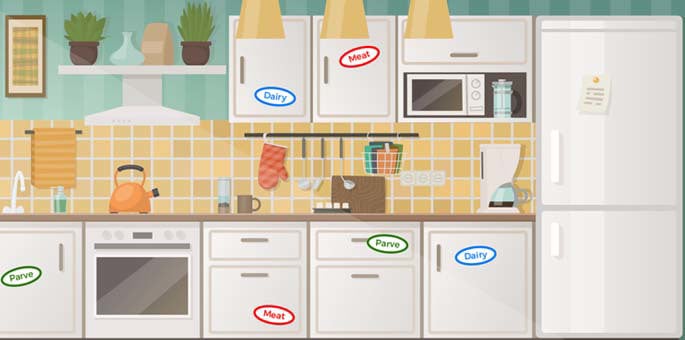Dear Rachel,
I am married to a wonderful, kind and caring man. We have been happy together for the last two decades. Over the past few years I have taken an interest in a more traditional Jewish lifestyle and, among other things, I am committed to keeping a kosher kitchen. My husband, on the other hand, couldn’t be less interested. He doesn’t see the value or importance in keeping a kosher home. I’ve tried to bring him to Torah classes and introduce him to rabbis I think he would connect with – to no avail. He wants to continue eating and living the way he always has. I wish I could get him to see the beauty and meaning that I have found. Do you have any words of wisdom for me?
Anna
South Africa
Dear Anna,
The situation you describe is not uncommon. There are many couples out there with one partner growing towards a more active Jewish life, while the other is quite content to ‘stay put.’ A question was once posed to our Sages, “Why was man given two eyes, while we have only one mouth and one nose?” They answer, “The left eye is for looking at yourself and seeing the areas where you need to improve, and the right eye is for you to look at others with kindness.”
In marriage it is so easy to see our spouses as an extension of ourselves. Often, we won’t cut them the same slack that we would allow for ourselves. All too often, we look at them with our “left eye.” But, it is really important to realize that they need just as much independence and lenience as we allow ourselves. G‑d gives us all equal opportunity to make choices. But as tempting as it may be, and as “right” as I may know that I am, I can’t enforce my choices for anyone else.
As the woman of the house, you can however, lay ground rules in your home. The woman is known as the High Priest of the home, setting the tone for the spiritual dimensions of domestic living. You have the ability to call the shots in terms of what is and is not permissible in your home. But that right extends to actions, not thoughts or feelings. These are way out of our realm. Simply put, asking your husband to keep the laws of kosher in your kitchen is within your right, but expecting him to find beauty, inspiration or meaning in the laws is not.
We are still left with a gap here. You are moving towards a certain goal and your husband is not, and that can be really hard on a relationship. In keeping with the right eye/left eye concept, it is important, more than ever, to reacquaint yourself with all the positive things that your husband does do. You mentioned above that he is ‘wonderful, good, and caring.’ Wonderful! Make sure he knows how much you appreciate the ‘everyday’ things he does. When you see him doing a caring act, let him know how that makes you feel; when he is helpful and kind, tell him how much you appreciate him. Kindness, goodness and compassion are all very “Jewish” things to do, so whether he realizes it or not, he is living a Jewish life in many ways already. Keep in mind that he is very likely feeling this gap as much as you are, and although you may not be pleased with the direction he is (not yet) heading, he’s going to need to know that he is still precious to you.
In terms of spiritual growth, we need to remember that everybody has got their own clock. We can’t set the pace for anyone else. What we can do is lead by example. The more you learn and grow and discover the beauty of Jewish life, the more enriched you will be become. When we see a truly peaceful and fulfilled person, that energy radiates from them. You don’t have to convince anyone that you are fulfilled, or that you are happy, you will simply just be. And that is something everybody can learn from. Even a seemingly disinterested husband.
I encourage you to grow in your Jewish learning and observance and accept that your husband is not where you are right now. Give him time to watch you evolve, to see the subtle changes, to feel the sweetness of a Jewish home. If he can experience the beauty that you have found without pressure to ‘be like you,’ perhaps he will begin to explore his own connection with Judaism. In the meantime, I encourage you to love him for the good, Jewish man that he is and continue to be the best Jewish woman you can be.
With many blessings to you both,
Rachel













Join the Discussion